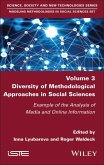This book offers a systematic view of social analysis that will advance the communication of results between different academic disciplines. It overcomes misunderstandings that are due to the use of an unstructured variety of methodological traditions in the analysis of complex socioeconomic and political processes. The book focuses on the special features of human society: humans as subjects, non-repetitiveness and irreversibility of social actions, and the peculiar relations between necessity and possibility in human action. It defines methodological criteria, procedures and rules that enable researchers to select and classify realistic hypotheses to derive general principles and basic organizational features. It then applies these criteria in critical reviews of major theories and interpretations of society and history, offering clarifications and alternative proposals with regard to crucial aspects of anthropological, political, juridical, sociological, and religious thought.
Dieser Download kann aus rechtlichen Gründen nur mit Rechnungsadresse in A, B, BG, CY, CZ, D, DK, EW, E, FIN, F, GR, HR, H, IRL, I, LT, L, LR, M, NL, PL, P, R, S, SLO, SK ausgeliefert werden.









